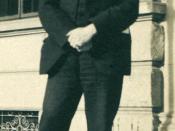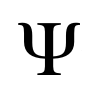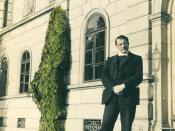The collective unconscious is an important concept in the psychology of Carl Jung. In general, Jung states that the collective unconscious is made up of characteristics that people have in common as a group and, some of the characteristics which are inherited at birth. These archetypes, in regards to Jung's essay, are the result of the many experiences of life that repeat themselves. They are symbols for the experiences of mankind.
Carl Jung considered the unconscious as an independent part of the mind. He says that one can never be directly conscious of. He claimed that it influences all experiences and behaviors, most especially the emotional ones, but people only know about it indirectly, by looking at influences.
The personal unconscious is like people's understanding of the unconscious in that it includes both memories that are easily brought to mind and those that have been suppressed for some reason.
Jung distinguished the personal from the collective unconscious; which later he considered to be the seat of "archetypes", universal symbols loaded with psychic energy. He stated that the content of the archetype is unconscious. According to Jung, it undergoes a transformation when it becomes conscious or when it is being perceived. He states that the way it is transformed depends on the state of consciousness of the individual, in which the archetype has arisen. Jung says that it is especially recognizable in such typical and important human situations as birth and death, adolescence, extreme fear or a fearful experience. During such life phases and experiences, he claims, archetypes will often appear in dreams.
Jung explained that the form of the archetype is only partially determined and that its content is a primal image that can only be given form when it is has become conscious, and thus has become...


